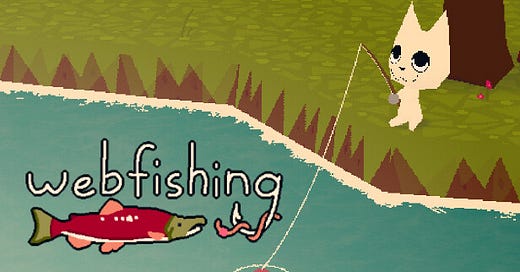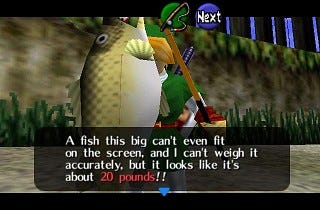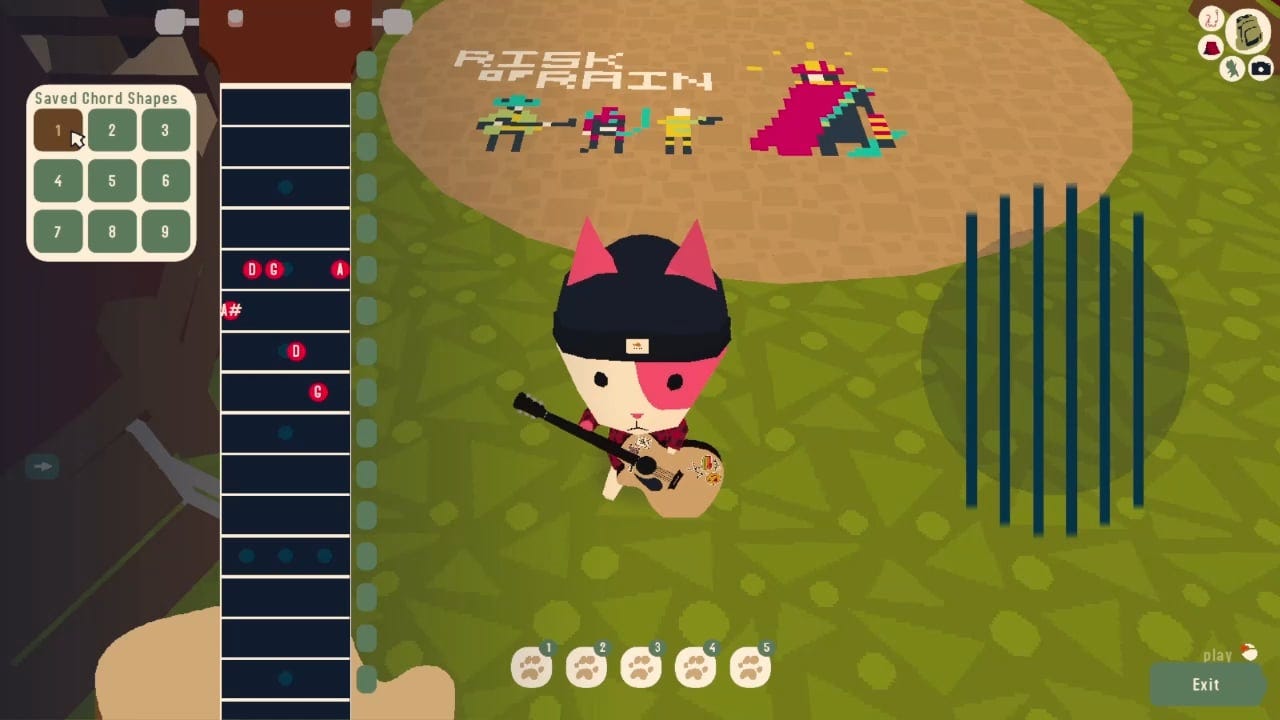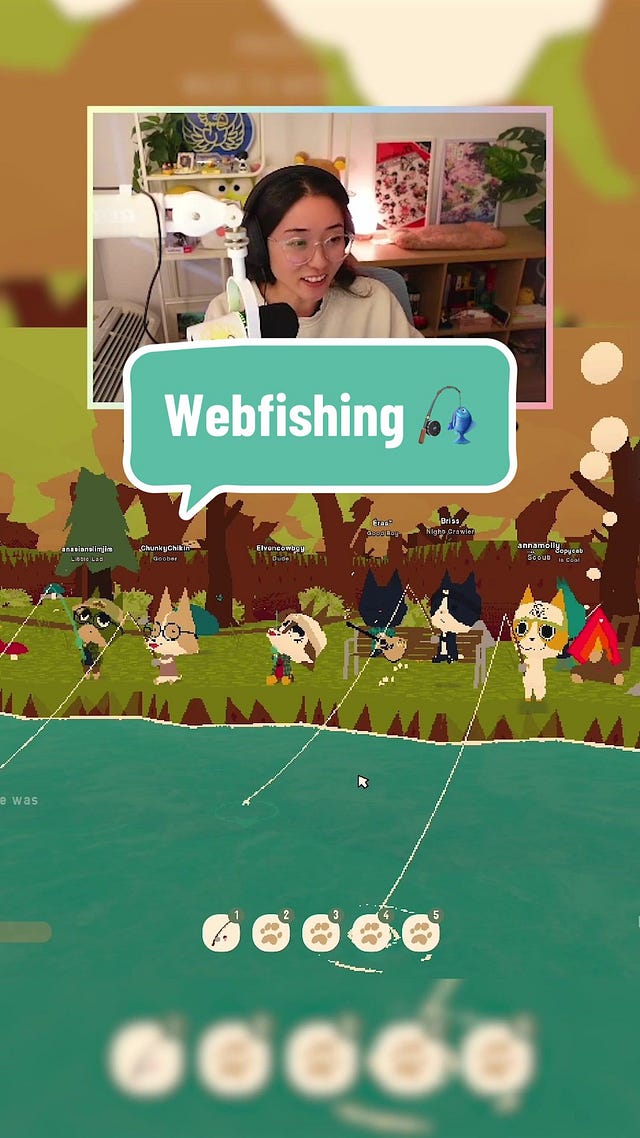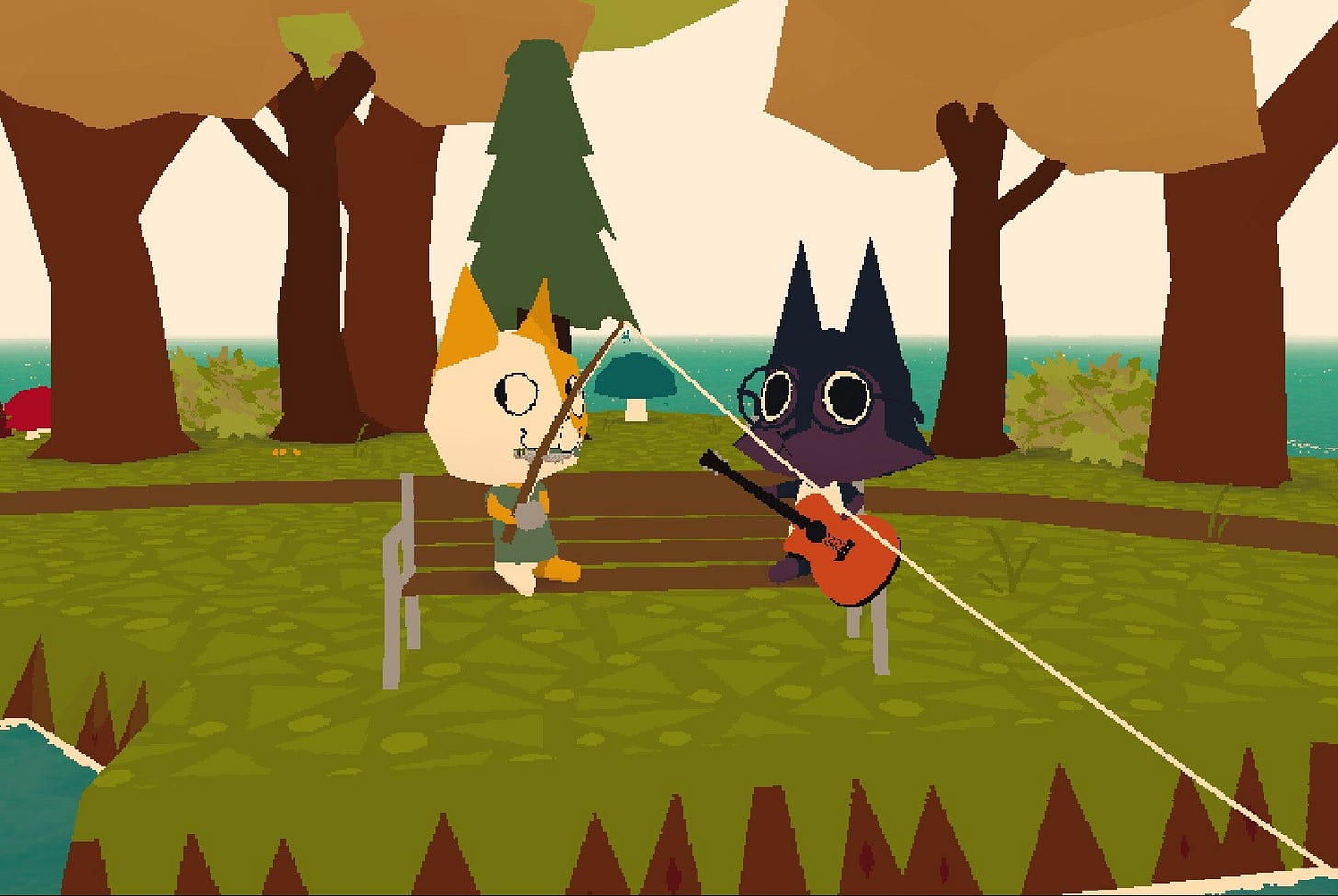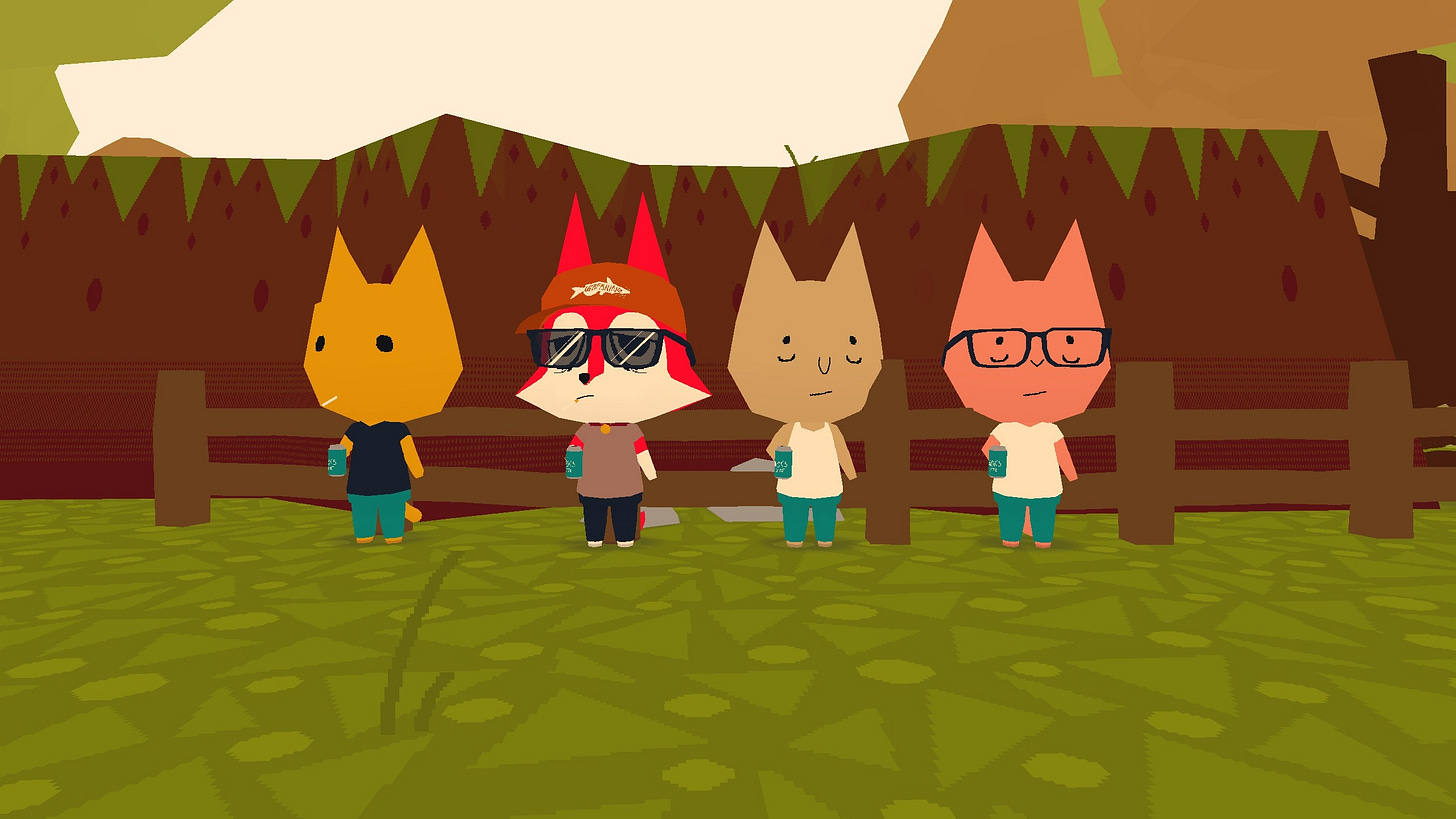Webfishing's Got Talent
Unintentionally, the most genuinely social online spaces could prime a music x gaming trend throughout 2025.
Here we are, coming straight back in 2025 - hi! Because I do whatever I want, I’ve decided to open my 2025 by writing about something relatively niche. It's had unprecedented success which I think indicates a wider cultural movement in gaming. Lastly I'll talk about my prediction on how I think music (and emerging artists) can interact with future spaces like this.
I’m aware I could have spoken about the successful Fisch on Roblox, but I don’t want to. So there.
What Is Webfishing
Fishing mini-game lore
Why is Webfishing different?
Webfishing’s Got Talent
1. What is Webfishing?
Webfishing is an online game where you fish and chat to people. It was made by one developer who expected only 100 people to play it when in reality it sold 1.5 million units in the first 3 months.
Webfishing release in October 24 and peaked at around 24,000 players shortly after launch. It's had a small decline of players since but still averages 2,100 per day (and has done for 3 months) keeping it in the top 500 currently played games list within Steam. For reference, Steam contains over 73,000 games. I’d say that was pretty good retention, supported by an ‘Overwhelmingly Positive’ review on Steam.
The style of the game is somewhere between Club Penguin and Animal Crossing with a community focus and a strong sense of communal identity. Graphics wise, the aesthetic of the game feel like its been created by early-00’s developers - somewhere between N64/PS1 era and browser-based RPG games like Runescape.
2. Fishing mini-game lore
I love fishing mini-games. Specifically mini-games though… I’ve got nothing against good ol’ fishing, but there’s something genuinely fun about a fishing game within a game. Examples include Legend of Zelda series, Pokemon (erm…Gyarados?), Red Dead Redemption 2 (I literally kept a save of Chapter 3 so I can just fish when I feel like it), NieR: Automata, Final Fantasy XV, Spiritfarer - the list goes on.
Fishing simulators as a dedicated game is a whole different kettle of fish (ha-ha). Fishing simulators are not what I’m speaking about today. I think the reason why I like it as a mini-game is because I actively choose to take a break from the main story and enjoy the environment in a game. Funnily enough - developers built mini-games as a break from the main story too. They are designed to be passive, peaceful experiences with no time limits and easy enough so that you can chat with friends while playing. This is supported by this article from Washington Post:
In video games, fishing falls into what “Spiritfarer’s” creative director Nicolas Guérin calls a “nice chore,” activities that he says alleviate the “burden” of thinking and solving challenges.
I can hear it now “But Webfishing is a dedicated fishing game meeeeehhhhh”.
Yes you're right. Webfishing however has something culturally important for music x gaming.
3. Why is Webfishing different?
Webfishing feels like one giant mini-game. I saw a Reddit post that summarised it well: “A game where we can just jump in, have fun and leave knowing it's just a cool game tomorrow. It's got grind for us grinders, jokes for the jokers and mischief for the mischievous'“
Most importantly players are treating it like a chatroom that has a pre-established ‘vibe’. An example of this is that in any game you can join a lobby of max 12 players and, no matter where you are fishing, you can see the lobby text chat populate. It’s just the right amount of players to keep the game from feeling faceless while having something passive to do to keep your brain ticking over.
I think this video does this perspective further justice so for further reading jump in here:
4. Webfishing’s Got Talent
Firstly, the theme is great.
Secondly, here’s a fun thing about Webfishing - it has a mini-game. You can buy a guitar and play whatever you want. They have built it in a way that it’s possible to play anything. Just like a real guitar. Who would have thought?
The system lets you select which notes on the guitar you want to play, which you can manually strum with your mouse on the right hand side. You can then save these ‘chords’ as pre-sets on numbers 1-9 on your keyboard. This means you can switch between chords with one hand while strumming with the other - just like a real guitar. This in-depth mechanic enables players to perform songs easily.
I saw this clip on TikTok of people playing songs and people congregating over this too:
 Tiktok failed to load.
Tiktok failed to load.Enable 3rd party cookies or use another browser
I know, the term ‘online chatrooms’ have always had a mixed reputation. As we are more and more protective over language and censorship online (not just the parents but the gaming companies too) we remove language agency and replace it with… well… music. That would make sense to me. So without actually speaking it looks like people can unify over songwriting.
The last time I’ve seen something similar to this was MyCoke, an MMO that looked just like Habbo Hotel where you can make your own mixes, perform it to a crowd, and earn ‘bottle caps’ based on the audiences rating.
Here’s an article titled “Webfishing players use in-game guitar for pop music ‘concerts’“ detailing how players are covering famous songs from artists like Blink-182, Radiohead & Green Day etc. (Publishers - I am not helping you solve that one, nor am I a grass!) …but what about an artist writing their own music?
I have made a bit of an optimistic prediction with this game. My original thought when this was just gaining some virality was that an artist could make a short series of videos where they perform a riff/song, receive good reviews (similar to what ‘slip away’ did on TikTok), and then release it properly as a track. A moment like this could easily be the ‘theme’ of the game across socials.
If this happened, this artist could easily write for other cozy games or even original lofi-style music, perhaps even featured on lofi girl, college music or anything similar. The playlisting count for this genre is generous from listeners yearning to emulate relaxation through sound.
The reason why I think this would work in Webfishing is that people know that this game is a place to go to genuinely have conversation with people in a relaxed and pressureless environment. Anything to avoid looking like a genuine marketing strategy is a win.
Despite my prediction being possible (but highly specific), a more important realisation came from this thought - I think there will be more online social spaces like Webfishing. To me, Webfishing is the start of a revival of digi-social communities - one where authentic creativity and therefore music sits at its core. I mean, even Brockhampton met through a forum. Will we see genuine creative contributions through music supersede ‘ranking’ and how will that value look?
In these social spaces authenticity is the currency that establishes artists value. Engaging with these spaces without a curated partnership could be a move. I can’t tell them how. This depends on who they are and what they’re like, but examples include Post Malone’s interview about Hunt: Showdown. Post Malone didn’t need to do this interview outside of the partnership - but did, and that’s the difference between the partnership and non-curated presence in the gaming world.
However, for an emerging artist, this is where your story could begin. With the resurgence of social games, music mechanics will get better, and audiences will be varied. Contributing in a fun and engaging way and having content ride any viral waves can’t be out of the picture for modern artists with a multi-faceted identities.
When finding your audience, there are always plenty more fish in the sea. Online social spaces like future Webfishing-style spaces can help you reel them in! (Okay I’ll stop now).
TLDR:
Webfishing is a simple game that accidentally sold 1.5 mil units, where you fish and chat. It has become an authentic and established chatroom/chillout ‘space’ for gamers. There is an in-built guitar function where players can play anything.
Webfishing’s sleeper success suggests a demand for genuine social spaces and therefore passive creative contributions (like music) rather than competitive play. Leaning into future social games without curation could catalyse the origins of an artist identity, or even reward established artists with a valuable authentic moment.

